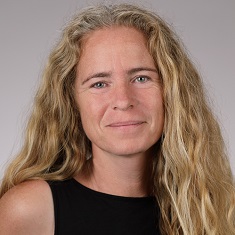
Kirsten Remmert, Ph.D.
- Center for Cancer Research
- National Cancer Institute
- Building 10-CRC, Room 3-5881
- Bethesda, MD 20892
- 240-858-3624
- remmertk@nih.gov
RESEARCH SUMMARY
Dr. Remmert studies the cell biology of metastasis and tumor cell dormancy, using confocal and intra-vital light microscopy imaging techniques. She is part of a research program on the establishment and interrogation of human and mouse tissue cancer models of the liver.
Areas of Expertise

Kirsten Remmert, Ph.D.
Research
The primary cause of death in cancer patients is metastasis. Tumor cells that disseminate from the primary site typically do not initiate growth right away, but rather transition into a dormant phase and are reactivated to give rise to metastatic outgrowth at a later stage. My research therefore centers on the biology of disseminated tumor cells (DTC) and how they manipulate and/or take advantage of the target organ microenvironment during dormancy and reactivation.
Publications
- Bibliography Link
- View Dr. Remmert's PubMed Summary.
Actin dynamics and competition for myosin monomer govern the sequential amplification of myosin filaments
Myosin 18A coassembles with nonmuscle myosin 2 to form mixed bipolar filaments
Nonmuscle myosin II isoforms coassemble in living cells
Capping protein regulatory cycle driven by CARMIL and V-1 may promote actin network assembly at protruding edges
Biography

Kirsten Remmert, Ph.D.
Dr. Kirsten Remmert obtained her Ph.D. in protein biochemistry and cell biology in the laboratory of Prof. Horst Hinssen at the University of Bielefeld, Germany in 1999, on a graduate student fellowship from the German Research Council. There, she studied the localization and function of gelsolin-like proteins in invertebrates. For her postdoctoral studies, she joined the Laboratory of Cell Biology at the National Heart, Lung, and Blood Institute (NHLBI) in Dr. John A. Hammer’s lab as a Visiting Fellow. From 2006 to 2018, she worked as a Staff Scientist at the NHLBI. During this time she focused on unconventional myosins and actin-binding proteins, applying mainly cell biology methodologies. In 2018 she transferred to Dr. Johnathan Hernandez’s lab in the Thoracic and Oncologic Surgery Branch, Center for Cancer Research, National Cancer Institute.